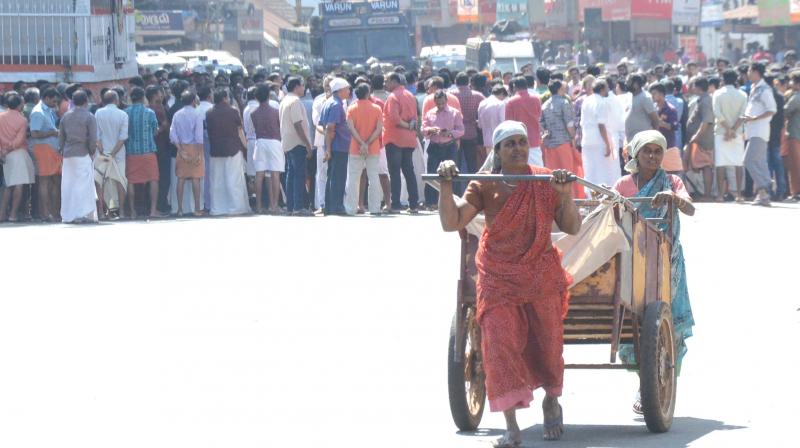A big NO to hartal
Laymen have begun to realise the futility of hartals and started responding to them, finally.

Looks like Keralites, except a minority, are fed up with the concept of hartal. In the past three months, the State witnessed seven hartals, out of which five were called by Hindutva parties and allied organisations for the same issue — women’s entry in Sabarimala.
In a broader sense, it has become a habit among almost all political parties in the State to call for hartal whenever there is an issue, be it serious or silly, and upset the smooth life of common man. However, the scenario is changing. Laymen have begun to realise the futility of hartals and started responding to them. Residents of places like Pallikkara in Ernakulam and Koolimadu in Kozhikode have already said a big ‘no’ to hartals, and they make it a point to come out of their homes and work hard on such days.
On January 3, shop owners in cities bravely opened shops despite threats from hartal supporters. At some places, it is reported that residents shooed away hartal defenders. All these point to people’s loathing of hartal.
Like Manoj Ravindran Niraksharan, an advocate of Say No to Hartal, says, “There is a public movement against hartal. People have turned against it. Yesterday, shops were open in Kochi and Kozhikode. We just had to support people by providing vehicles for those who were stranded in bus and train stations.”
When asked, people unanimously said that hartal was not the right way to find solution to an issue. They suggested it should be faced in a legal way. “What do we achieve from disturbing people’s lives and spreading violence in the name of hartal,” asks a woman irately.
Ananthu Vasudev, a native of Kottayam, opines that mostly political parties take up all these issues for their political existence. “So, the reason isn’t serious. Look back at previous hartals and the reasons behind them; there was nothing related to common men. And the results were zero. Hartals are meant just for a group of people to attack the rest of all,” he says and adds that there is no such thing called ‘janakiya (popular) hartal’. “These two words will not go together.”
Ananthu, who couldn’t travel to work yesterday, asserts that it would be the last time he sits at home during a hartal. “This time, I worked from home. Next time, I will work from office,” he vows.
Musician Rakesh Kesavan, a native of Kochi, says that though he strongly supports the spirit of Keralites in voicing their opinions and acting against unacceptable things, he detests hartals. “Our people are brave enough to question unacceptable things. Others have a lot to learn from us. But putting ordinary men in trouble and destroying assets will not solve an issue. We need to find other fruitful ways of protests,” he says.
“It is really childish to call for a hartal for implementing the Supreme Court order,” feels Sujith Varghese, a native of Kochi, about Thursday’s hartal. “Every hartal affects our lives. If it is a party’s right to call for hartal, it is my right to decide whether I should take part in it or not. However, the public transport system should never become a part of such short notice hartal. This array of hartals is, for sure, going to be a big dampener for tourism sector, which is slowly recovering from the floods and Nipah,” adds Sujith, who works in the hotel industry.
A volunteer of Say No To Hartal, Ananthu has seen the worst of it all. He knows how hartals adversely affect people’s lives. “I have been supporting the campaign since 2013, and have volunteered in Kochi from 2013 to 2015. I have worked in Kottayam too. However, there is no active group in Kottayam, and we are working to build one here. I have handled calls of affected persons and received death threats for participating in it,” he says, but he is not willing to give up. In fact, none of them are. What Keralites now dream is a hartal-free life!
